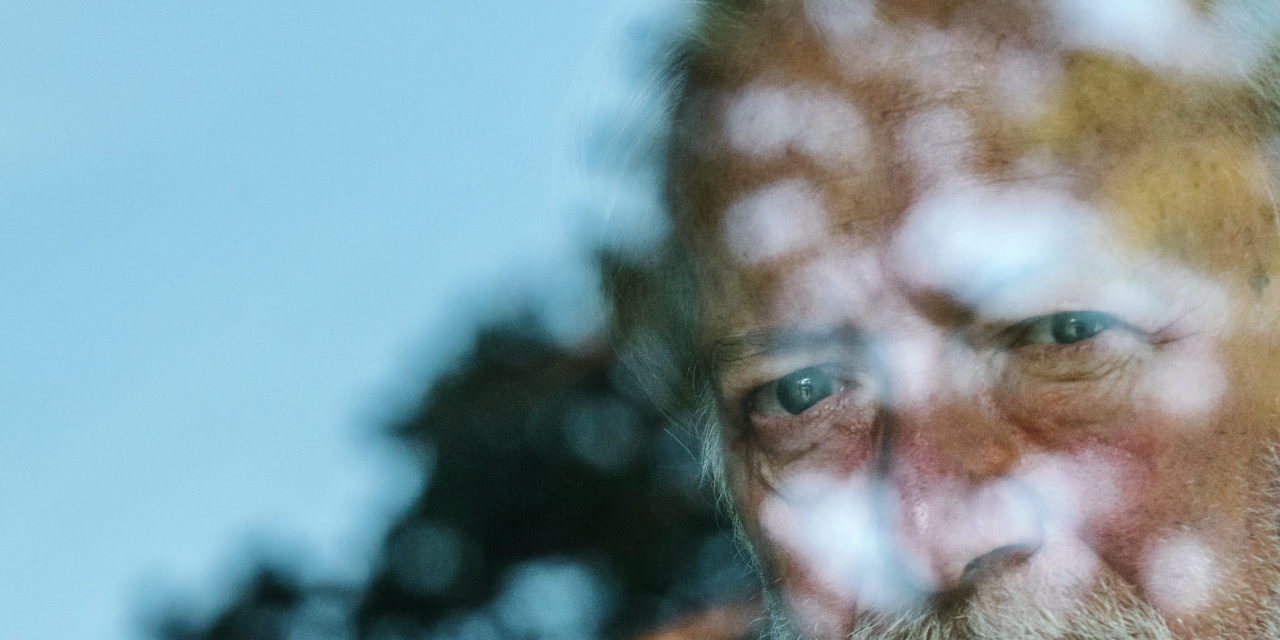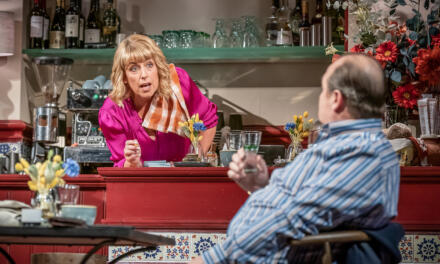Terry Eagleton reminds us that in order for tragedy to occur, then the protagonist must be in search of their own complete individual identity of freedom [1]. That freedom, as I understand it, comes in multiple forms. Usually, if we begin in the Aristotelian sense, the harmatia (or, the tragic “flaw”) is that the character cannot be in control of the desired fate that (in ancient terms) the gods have set for them.
In the case of Y Tad, that fate is out of the hands of Arwyn, the central protagonist of this story. As previously mentioned in my last article a few weeks ago, Florian Zeller’s undoubted magnum opus The Father, premiered in Paris in 2012 and has not yet ceased its relentless shelling of family, redemption, and suffering upon audiences across the globe. Last night, Theatr Genedlaethol Cymru presented the first Welsh translation by Geraint Løvgreen, directed by Artistic Director Arwel Gruffydd at the Sherman Theatre in Cardiff. To say that the play hasn’t called for a ceasefire yet would be unwise. On the contrary, it continues to progress.
To say I entered the auditorium with an agenda is a little misguided. However, it was abundantly clear to me that the text already has resonance from the outset having read it multiple times before. What I was most interested in was the concept with which Gruffydd’s production mined as the central source. What was shaped from this popular text in opposition to other global productions? Gruffydd suggests that it’s the notion of dignity which remained central to discussions during rehearsals. How can someone retain their dignity with such a mechanical farce occurring all around them?
Gruffydd’s intimately-shaped production of a man on a downward-spiral is boxed in the modern space that would somewhat be reminiscent of a standardized (and familiar) urban apartment. A tree, with its leafless branches, peers through the window (Zeller’s harking to the previous farces of the French tradition in Waiting For Godot perhaps?). There’s a European influence–much of “Toneelgroep Amsterdam‘s” productions spring to mind with the clinicalness of Erin Maddock’s contained scenography, and I must stress at this point that the influence of European work on Welsh theatre is a step I would like to see happening more in Wales. As a side-note, anyone who isn’t a fan of the standardized scene-changes we’ve come to know from a stark stage will rejoice in seeing them become a visible part of the action. This is the beginning of a meta-theatrical layer, something which I will return to soon.
We understand that the play deals with complex themes of a condition that will undoubtedly increase in the coming years. Yet, living with Alzheimer’s shouldn’t be the only concept for every production of this play. In fact, it is only the surface. The abyss sits in the uneasiness of broken family and this production highlights this through sheer trust in allowing a space to be evoked with such clarity that the company may play within it freely and mercilessly. What is crucial to understand is that Arwyn is the sanest person in the play. Everyone else is mad. Through Arwyn, we see the unfolding of madness of others, bringing about the question (as clear as it is in both the original text and Løvgreen’s well-tempered translation) what was ever real? We, like Dyfan Roberts’ Arwyn, can stand bewildered and aghast as the world changes around us.
But even Christopher Hampton’s original English translation begins with the label that this is a “tragic farce” [2]. The Dario Fo and Carlo Goldoni works resurrect themselves within the historiography of this term, but it’s worth signifying that a farce can be comedic composition within a shell of bitter truth. To put it another way (and in a very Beckettian sense) there is laughter on the road to tragedy. Zeller’s text should be open enough to allow the audience to dictate the unsettledness of the action. The technicalities of this performance can sometimes dictate where the heart of the audience is going to go next, which can sometimes be injudicious to a narrative driven on the idea that despite the unruliness of the action, everything should seem completely sane and regular.
Dyfan Roberts’ Arwyn is a fraught child. It’s through this performance we can see a careful unfolding that the condition undertakes. The worst objective for a performance with such “baggage” as this character would be to place the unmindedness too soon in the composition of the directorial structure, but this was not the case. Compared to the unsustainable truth of Catrin Mara as his daughter Ann and the tenacity of Dafydd Emyr’s Pete, the play is complemented by the certain mindsets that such an illness like Alzheimer’s brings to those individuals. I must confess that the condition has never breached into my life thus far, nor have I any experience of dealing with such matters. But as with any tragic outcome within a family, I understand that a dangerous cosmos of emotion can be unleashed, and the company of Y Tad tread through this with care and stability with the reminder (and in the case of Emyr in particular) that it isn’t enough to label a character as simply “cruel” or “kind” or whatever else. Such a condition brings out the worst in people as well as the best. This is a cast who fully embrace the notion of dignity throughout the performance.
In the final moments, with Arwyn in his most nakedly fragile state, the leaves of his baring tree fall from the sky. The performativity of the moment is heightened. Lionel Abel contests that tragedy no longer exists and all we have left is a constant reminder of an inherent meta-theatricality, or, the complete awareness of theatricality in a performance itself [3]. Arwyn is the man out of character and completely inside his own body whilst everyone shuffles around to play their part around them. In Theatr Genedlaethol Cymru’s production, the “well-made play” is coated with new meaning; knowing that when we lose a grip on reality, it’s others who will also suffer as well as the suffering. Life is not so “well-made” as we would like it to be.
I believe that the best texts of the contemporary age allow for a certain concept to be re-imagined. It’s what we would call in Amsterdam the “regietheater,” or, the director’s theatre. Much scorned and much celebrated on the same level, but no one can contest that it brings originality and air to those pockets that exist within the major themes of any production. Gruffydd’s production uses illness as its core theme, but it’s not the instigator. The instigator is illusion; what’s real and what’s not. As I said in my previous article, the universality of human suffering can be translated into any language. Language aside (something I spoke of great length about in the previous article), we are left in the final moments with the uncanny truth that this is a tragedy best waded through together; with dignity.
Geraint Løvgreen’s Welsh translation of Florian Zeller’s undoubted masterpiece Y Tad, directed by Arwel Gruffydd, will continue to tour across Wales until March 16, 2018. The tour schedule can be found here. Tickets are available at each venue individually.
[1] I refer you here to Terry Eagleton’s book Sweet Violence (2002), in which the parameters of theatrical tragedy are carefully marked.
[2] Zeller, Florian (2015) The Father, Faber & Faber ed.
[3] I can refer here to Lionel Abel’s book Tragedy & Metatheatre: Essays On A Dramatic Form (2003)
This post was written by the author in their personal capacity.The opinions expressed in this article are the author’s own and do not reflect the view of The Theatre Times, their staff or collaborators.
This post was written by Christopher Harris.
The views expressed here belong to the author and do not necessarily reflect our views and opinions.


















